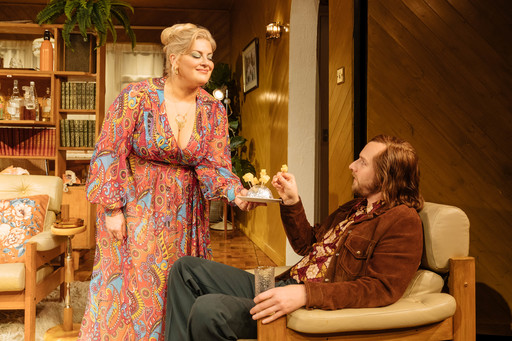Abigail's Party @ King's Theatre, Edinburgh
This new production of Mike Leigh's 1977 classic Abigail's Party is deprived of tension and momentum by an overblown lead performance
Aah, the 70s: pineapple on sticks, paisley print, punk, power cuts and Demis Roussos. Mike Leigh’s 1977 classic Abigail’s Party is a play so inextricably rooted in the era in which it was created that is virtually impossible to imagine how a modern production could deviate at all from the original. These days, this less-than-flattering portrait of suburban life in “theoretical Romford” is granted added caricature and cringe by having become a period piece.
In Sarah Esdaile’s production, the gaudy trashiness of the petite bourgeoisie is rendered even more tasteless by the lurid 70s detail that dominates the set design and costumes. While by no means a love song to the era, it's undoubtedly an affectionate, wry wink of a play, and the 70s looms as a spectre throughout in a manner that is even more overbearing than the play’s indomitable dinner party host protagonist.
It's much more than a nostalgia piece, however. The themes of middle-class ennui, social aspiration and unfulfilling relationships are timeless, as is Leigh’s painfully incisive and keenly observed script. The Pinteresque existential void beneath the small talk is what makes the play an enduring classic.

The success of Abigail’s Party relies heavily on the central performance. The role of Beverly – the archetypal materialistic, self-absorbed and domineering housewife who would later evolve in the collective imagination into Hyacinth Bucket and Betty Draper– was immortalised (and, indeed, partly devised) by Alison Steadman. A tough act to follow at the best of times, Steadman’s portrayal is so definitive that it is difficult to convey Beverly without resorting to imitation.
Unfortunately, this production is ultimately let down by Jodie Prenger’s straining attempts to channel Steadman. Prenger gurns her way through the show as she tries to copy her predecessor’s idiosyncratic facial expressions, and her impersonation of Steadman’s voice results in a cartoonishly nasal delivery that sounds more like Boycey from Only Fools and Horses. While undeniably funny, Prenger’s performance lacks the subtlety and nuance that is required to prevent the character being a reduced to a pantomime dame.
We need to see some vulnerability in order to feel the small, but essential, degree of sympathy towards Beverly that gives the play its power. Prenger’s bulldozing deprives the play of tension, momentum and capacity for escalation, and gives her co-stars Vicky Binns and Daniel Casey, whose characterisation is more rounded and assured, lamentably little to work with.
Abigail's Party @ King's Theatre, Edinburgh, run ended
